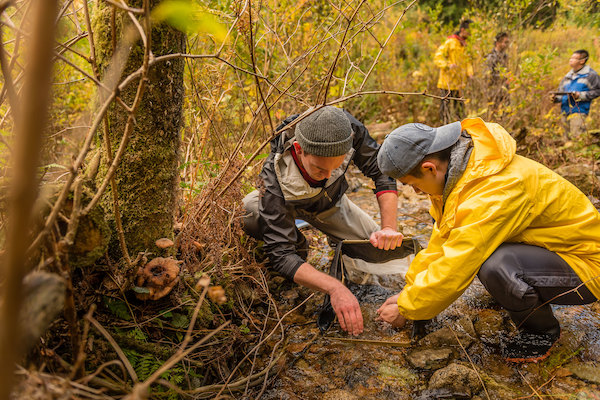
Sustainability is one of the biggest challenges facing our planet. A Bachelor in Sustainability at UBC’s Okanagan campus will give you the skills to critically assess and propose solutions to contemporary sustainability challenges, such as climate change, pollution, and social and economic inequality.
UBC Okanagan’s Bachelor of Sustainability, the only dedicated degree in sustainability in Canada, will develop your skills and knowledge to enable you to take action to solve sustainability problems at both a local and global scale.
Hands-on learning and research
As a Bachelor of Sustainability student, your degree is fully immersive, with research and community-based learning opportunities imbedded in the curriculum.
Because UBC Okanagan is located in a unique environment, you’ll have access to urban, agricultural, and wilderness environments that will become your real-world labs.
You will have the opportunity to work together with faculty to conduct or assist with research projects. You can participate in research either as a volunteer research assistant, or through Directed Studies opportunities.
Meet your professor
Meet Lael Parrott, a professor in Sustainability at UBC’s Okanagan campus.
“The UBC Okanagan campus is exceptional because it has easy accessibility to different environments for teaching and research. Urban, agriculture, and aquatic systems are all local. This is an incredible asset…The students can go out and see the ecosystems they’re studying. It’s not just textbook knowledge.”
What you learn in the Bachelor of Sustainability
The Bachelor of Sustainability combines a broad interdisciplinary approach – course content spans the humanities, social sciences, and natural sciences – with focused concentrations to develop your skills and knowledge.
All students take core Sustainability courses along with courses specific to their concentration. You can choose from the following four concentrations:
Environmental Analytics
The Environmental Analytics concentration supplements core knowledge of sustainability with powerful modeling and simulation techniques that exploit geographical data. You will to understand, model, simulate, explain, and extrapolate the behaviour of complex environmental systems.
Environmental analytics graduates will be well-equipped to tackle sustainability challenges through evidence-based data analysis. Job opportunities range from climate action analyst and impact assessment analyst to sustainability consultant and data analyst.
Learn more about Environmental Analytics
Environmental Conservation and Management
The Environmental Conservation and Management concentration provides you with an understanding of the challenges of sustainably managing and preserving terrestrial and freshwater environments and resources.
You will gain a comprehensive understanding in environmental and natural resources management, land use and ecosystem services assessment, resource economics, and environmental impact assessment.
Job opportunities range from environmental assessment specialist and sustainability consultant to environmental coordinator and Indigenous resource management.
Learn more about Environmental Conservation and Management
Environmental Humanities
Environmental sciences can tell us what is happening to our planet, but not why. The Environmental Humanities seek to explain and transform the cultural and historical foundations of environmental crisis.
You will enter into constructive dialogue with other subject areas to analyze and address a wide range of issues in sustainability.
Job opportunities range from impact assessment analyst and environmental assessment specialist to sustainability specialist and advisor in sustainability reporting.
Learn more about Environmental Humanities
Green Chemistry
The Green Chemistry concentration analyzes how modern society relies implicitly on an affordable supply of materials, textiles, fertilizers, and medicines, all of which must be synthesized from other substances by chemical reactions.
A sustainable society is impossible without the creation of improved production methods for these commodities. Such efforts will require the development of new synthetic procedures with an increased reliance on innocuous solvents, renewable and benign reagents, and efficient catalysts.
Job opportunities range from junior environmental analyst and environmental technician to environmental assessment specialist and advisor in sustainability reporting.
